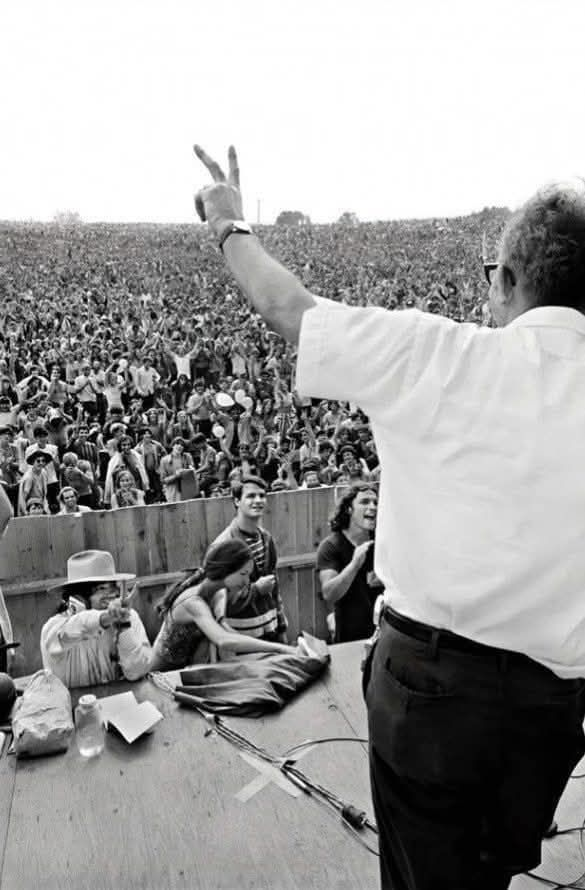On the third day of the Woodstock Festival, just as afternoon was settling in and anticipation hung in the air like the humid summer heat, Max Yasgur climbed a makeshift stage to address the crowd. He was a simple farmer, rough hands from decades of working his fields, not a politician, not a speaker trained in rhetoric. But in that moment, he became the voice of something much larger than one man or one farm.
“I’m a farmer,” Yasgur began, with the kind of humility that immediately quieted murmurs among the thousands gathered before him. “I don’t know how to speak to twenty people at one time, let alone a crowd like this.” He paused, surveying the sea of faces. Young. Old. Hopeful. Curious. A community made suddenly vast under sky.
Yet, despite the scale, despite the heat, the dust, and the discomforts, Yasgur’s voice held no anger. No judgment. Instead, he spoke with plain wonder: “But I think you people have proven something to the world — not only to the Town of Bethel, or Sullivan County, or New York State; you’ve proven something to the world.” He acknowledged what everyone was feeling: that this gathering was extraordinary, unprecedented. He observed that in terms of sheer numbers, no one had expected so many people—half a million—assembled in one place, for three days, under circumstances few could control or predict.
He didn’t shy away from admitting the hardships: limited water, scarce food, exhaustion. These were real. Many were suffering through heat, confusion, delays, discomforts birthed by sheer human scale. But he also believed the organizers had carried weight beyond what anyone expected—they had done “a mammoth job” ensuring people were looked after. They were trying, against odds. And for that, he asked the crowd to offer its thanks. Because even in chaos, he felt something beautiful was unfolding.

Then he said the thing that made silence ripple across all those thousands: you, the young people here—“half a million kids”—have shown something remarkable. He called them kids as an affectionate term; many in his audience were younger than his own children. He said that in all their youth and inexperience, in the face of unpredictability and need, they had come together for three days of music—with fun, with shared struggle—and nothing more. No violence, no riot. Just music. Just peace. Just people. And he blessed them. “God bless you for it!”
In that moment, Max Yasgur made a statement that was more than a speech. It became a symbol.
Because think about it: what is needed to gather hundreds of thousands of people who don’t know each other, under imperfect conditions, and have them emerge from the experience changed—not wrecked. What is needed to understand that, even when expectations fail, even when logistics collapse, even when rain or dust or despair threaten, people will rise. They’ll sing. They’ll dance. They’ll share meals (if they can find them). They’ll be kind (if they can be). And they’ll stay.
This wasn’t just a festival. It was an experiment in community. In trust. In what happens when music, hope, and a willingness to put up with discomfort combine. It’s easy, in hindsight, to romanticize, but the heat was real. The hardships were real. Sunburned skins, tired limbs, patience tested. Yet through it all, that afternoon, Max Yasgur looked out over hundreds of thousands and saw something more powerful than any challenge. He saw possibility.
He saw that people—especially young people—can gather, can share, can create beauty, and can do so more than just surviving—they can thrive through music, through togetherness. It’s a reminder, decades on, that sometimes the hardest moments are when we discover what we’re really made of.
Max Yasgur passed away a few years after that day. He never became a superstar or a politician. But that afternoon, strong and sincere, his voice became part of Woodstock’s lasting echo—one that says: maybe gathering isn’t always about comfort. Sometimes it’s about courage. And through courage, we find connection.